Every powerlifter obsesses over the perfect program, the ideal rep scheme, and the latest accessory movements. We analyze our form frame by frame, track our macros to the gram, and debate whether sumo or conventional is superior. But there’s one variable that might be more important than all of these combined, yet it’s often treated as an afterthought: sleep.
While you’re lying in bed, your body is performing the most critical part of your training program. This isn’t downtime—it’s when the real magic happens. Your muscles repair, your strength gains are consolidated, and your nervous system recovers from the beating you gave it under the bar.
The Science Behind Sleep and Strength
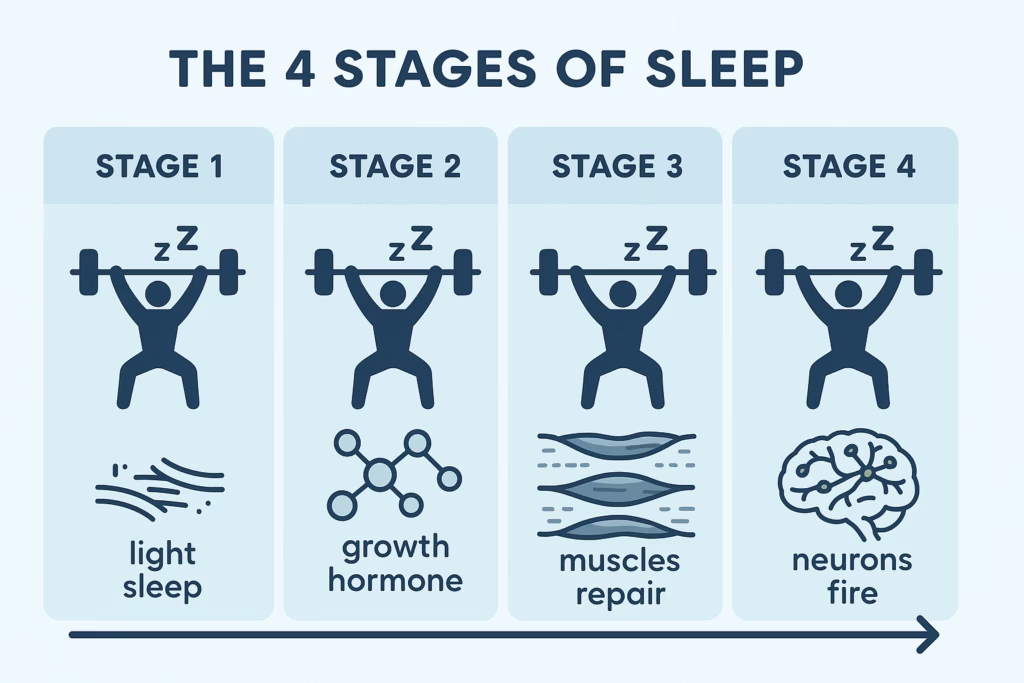
During deep sleep, your body releases the majority of its growth hormone for the day. This powerful anabolic hormone is essential for muscle protein synthesis, tissue repair, and overall recovery. Without adequate deep sleep, you’re essentially training with one hand tied behind your back.
Research consistently shows that athletes who get less than seven hours of sleep experience significant decreases in performance. One study found that basketball players who increased their sleep to 10 hours per night improved their free throw accuracy by 9% and their three-point shooting by 9.2%. While powerlifters aren’t shooting baskets, the principle remains the same—sleep directly impacts motor skills, reaction time, and the ability to execute technical movements under load.
What Happens During Each Sleep Stage
| Sleep Stage | Duration | Key Recovery Processes | Impact on Powerlifting |
|---|---|---|---|
| Stage 1 (Light Sleep) | 5-10 minutes | Transition from wake to sleep | Minimal recovery benefit |
| Stage 2 (Light Sleep) | 45-55% of total sleep | Body temperature drops, heart rate slows | Basic physical recovery begins |
| Stage 3 (Deep Sleep) | 15-25% of total sleep | Growth hormone release, tissue repair | CRITICAL for muscle growth and strength |
| REM Sleep | 20-25% of total sleep | Memory consolidation, skill learning | Motor pattern refinement, technique improvement |
Your nervous system also undergoes critical recovery during sleep. Powerlifting is incredibly demanding on your central nervous system, especially when you’re lifting at 85-95% of your one-rep max. Without proper sleep, your CNS becomes increasingly fatigued, leading to decreased force production, slower bar speed, and increased injury risk.
The Hidden Costs of Poor Sleep
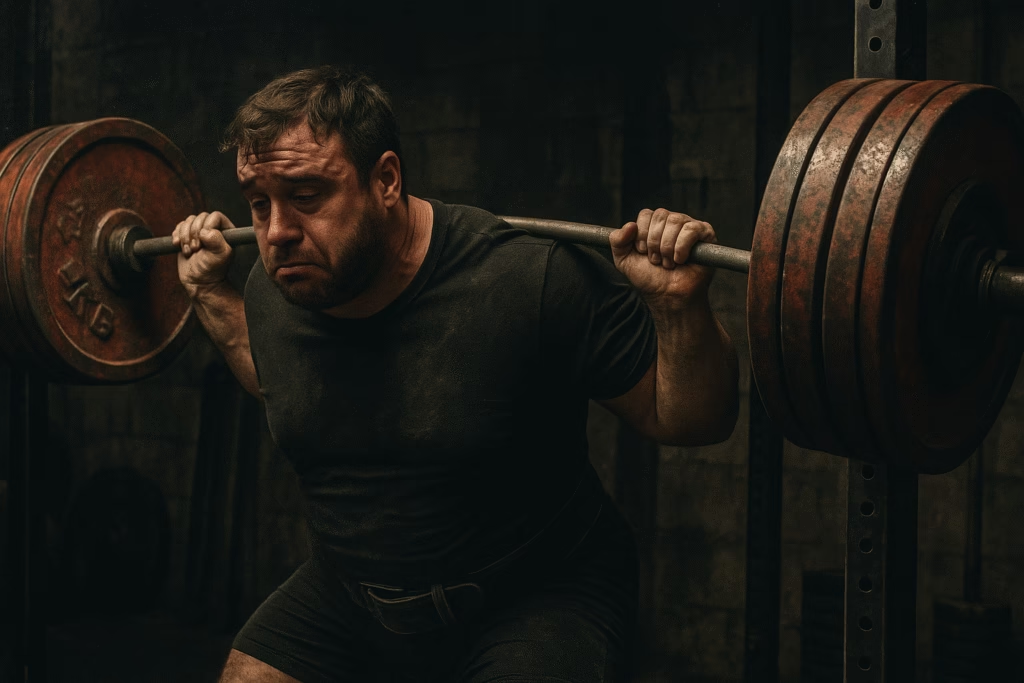
Sleep deprivation doesn’t just make you feel tired—it actively sabotages your training in ways you might not realize. When you’re sleep-deprived, your body produces more cortisol, a stress hormone that breaks down muscle tissue and impairs recovery. It also reduces testosterone production, which is crucial for strength development and muscle growth.
Sleep Deprivation vs. Performance: The Numbers Don’t Lie
| Hours of Sleep | Strength Performance | Recovery Rate | Injury Risk | Testosterone Levels |
|---|---|---|---|---|
| 9+ hours | 100% (baseline) | Optimal | Lowest | Normal |
| 7-8 hours | 95-100% | Good | Low | Slightly reduced |
| 6-7 hours | 85-95% | Moderate | Moderate | 10-15% reduction |
| 5-6 hours | 70-85% | Poor | High | 15-20% reduction |
| <5 hours | <70% | Very poor | Very high | 20%+ reduction |
Poor sleep also affects your pain tolerance and perception of effort. That weight that felt manageable last week might feel impossibly heavy today, not because you’ve gotten weaker, but because your sleep-deprived brain is telling you it’s harder than it actually is. This can lead to missed reps, reduced training volume, and a frustrating plateau in your progress.
Perhaps most importantly, inadequate sleep increases your injury risk. Your reaction times slow, your balance suffers, and your ability to maintain proper form under fatigue decreases. In a sport where you’re regularly handling 2-3 times your body weight, this can be the difference between a successful lift and a trip to the physical therapist.
The Sleep-Strength Connection: Real-World Impact
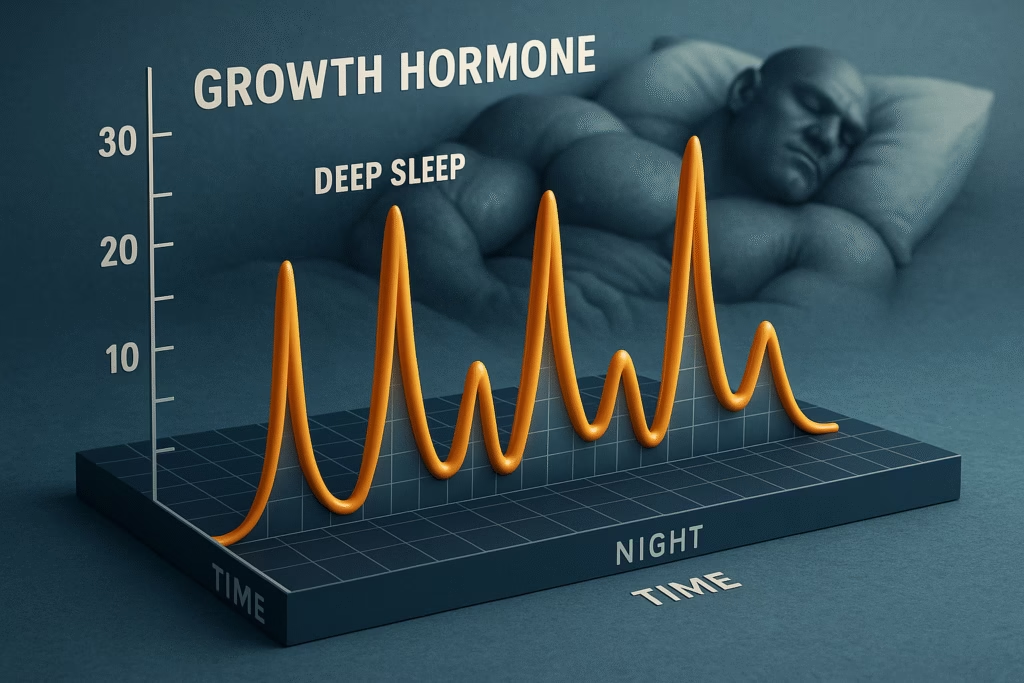
Let’s break down exactly how sleep affects your three main lifts:
Squat Performance and Sleep
Poor sleep affects your squat in multiple ways. Your balance and proprioception suffer, making it harder to maintain proper positioning in the hole. Your core stability decreases, and your ability to generate maximum force through your legs diminishes. Many powerlifters notice their squat depth becomes inconsistent when sleep-deprived, often cutting their squats high without realizing it.
Bench Press and Recovery
The bench press requires precise shoulder stability and neurological coordination. Sleep deprivation reduces your ability to maintain proper shoulder positioning and can lead to uneven bar paths. Your pressing power also decreases significantly—studies show that bench press performance can drop by 10-20% after just one night of poor sleep.
Deadlift and Central Nervous System Fatigue
The deadlift is perhaps the most CNS-demanding lift, and it’s often the first to suffer when you’re under-recovered. Sleep-deprived lifters frequently report that their deadlift “feels glued to the floor” even at weights they normally handle easily. This is your nervous system telling you it’s not ready for maximum output.
Optimizing Your Sleep for Maximum Gains
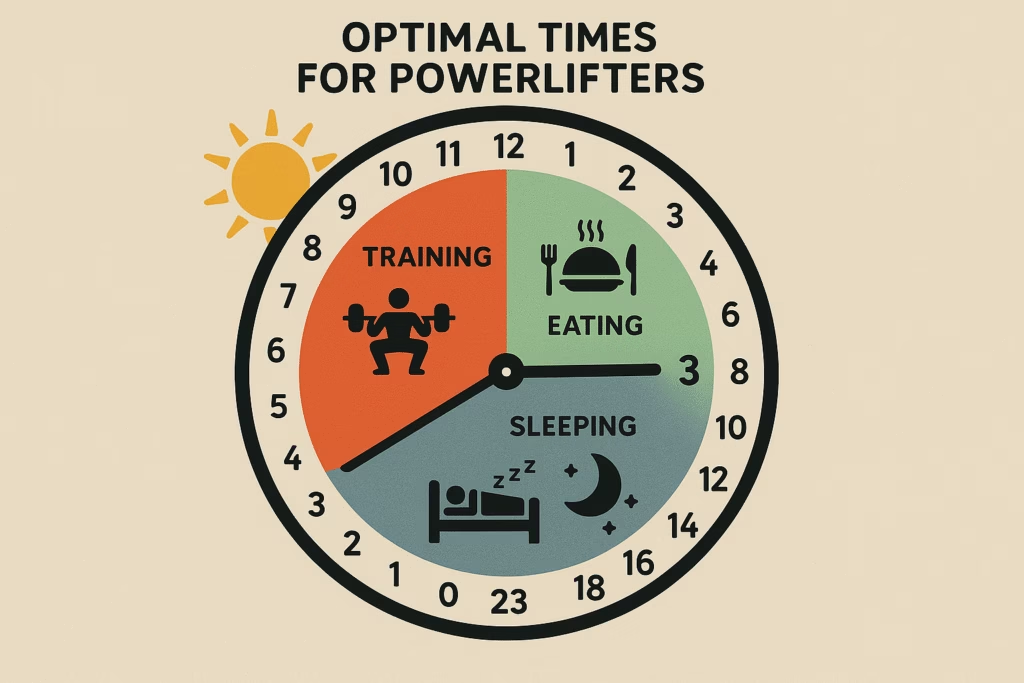
The good news is that improving your sleep doesn’t require expensive equipment or complicated protocols. Here are the key strategies that will have the biggest impact on your recovery and performance:
The Powerlifter’s Sleep Optimization Checklist
| Area | Action Items | Why It Matters | Easy Implementation |
|---|---|---|---|
| Duration | 7-9 hours nightly (8-9 ideal) | Complete recovery cycles | Set consistent bedtime alarm |
| Consistency | Same sleep/wake times daily | Regulates circadian rhythm | Weekend discipline is key |
| Environment | Cool (65-68°F), dark, quiet | Promotes deep sleep stages | Blackout curtains, fan/AC |
| Pre-Sleep Routine | 1-2 hour wind-down period | Signals body to prepare for sleep | No screens, light stretching |
| Training Timing | No heavy lifting 3-4 hours before bed | Prevents elevated core temperature | Schedule morning/afternoon sessions |
| Caffeine Cutoff | 6+ hours before bedtime | Prevents sleep interference | Track your last caffeinated drink |
Advanced Sleep Strategies for Serious Lifters
Sleep Tracking: Use a fitness tracker or smartphone app to monitor your sleep duration and quality. Look for patterns between poor sleep nights and decreased performance in the gym. Most lifters are shocked when they see the correlation.
Nap Strategy: If you’re sleep-deprived, a 20-30 minute nap 6-8 hours after waking can provide significant recovery benefits without interfering with nighttime sleep. This is particularly useful for lifters who train twice per day.
Temperature Manipulation: Your body temperature naturally drops as you prepare for sleep. You can enhance this by taking a hot shower or bath 60-90 minutes before bed. The subsequent cooling effect signals your body it’s time to sleep.
Light Exposure: Get bright light exposure (natural sunlight is best) within the first hour of waking. This helps set your circadian rhythm and improves sleep quality that night. Conversely, dim the lights in your home 2-3 hours before bedtime.
Nutrition and Sleep: The Recovery Partnership
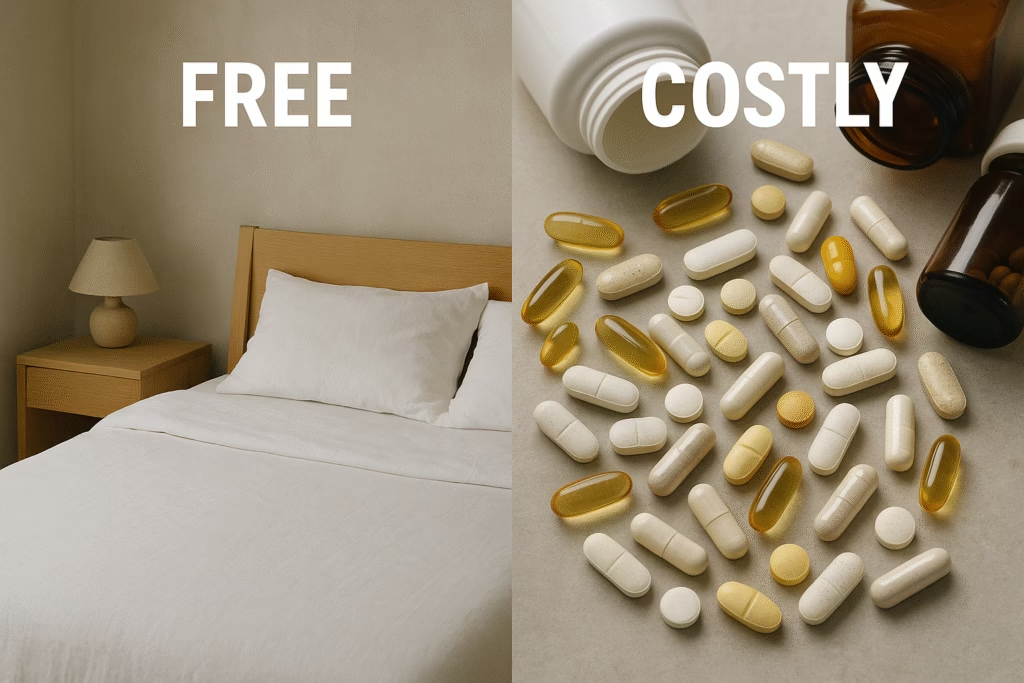
What you eat and when you eat it significantly impacts your sleep quality and, by extension, your recovery:
Pre-Sleep Nutrition Guidelines
| Timing | What to Eat/Avoid | Why | Examples |
|---|---|---|---|
| 3+ hours before bed | Large meals | Prevents digestive interference | Full dinner with protein/carbs |
| 1-2 hours before bed | Light protein snack | Supports overnight recovery | Greek yogurt, casein protein |
| 30-60 minutes before bed | Small carb snack (if needed) | Can promote sleepiness | Banana, handful of berries |
| Avoid before bed | Alcohol, large fluid intake | Disrupts sleep cycles, causes awakenings | Save the post-workout beer for earlier |
Hydration Balance: Stay well-hydrated throughout the day but taper fluid intake 2-3 hours before bed to minimize sleep disruptions from bathroom trips.
Magnesium Supplementation: Many powerlifters find that 200-400mg of magnesium glycinate 30-60 minutes before bed improves sleep quality and reduces muscle tension.
The Mental Game: Sleep and Psychological Recovery
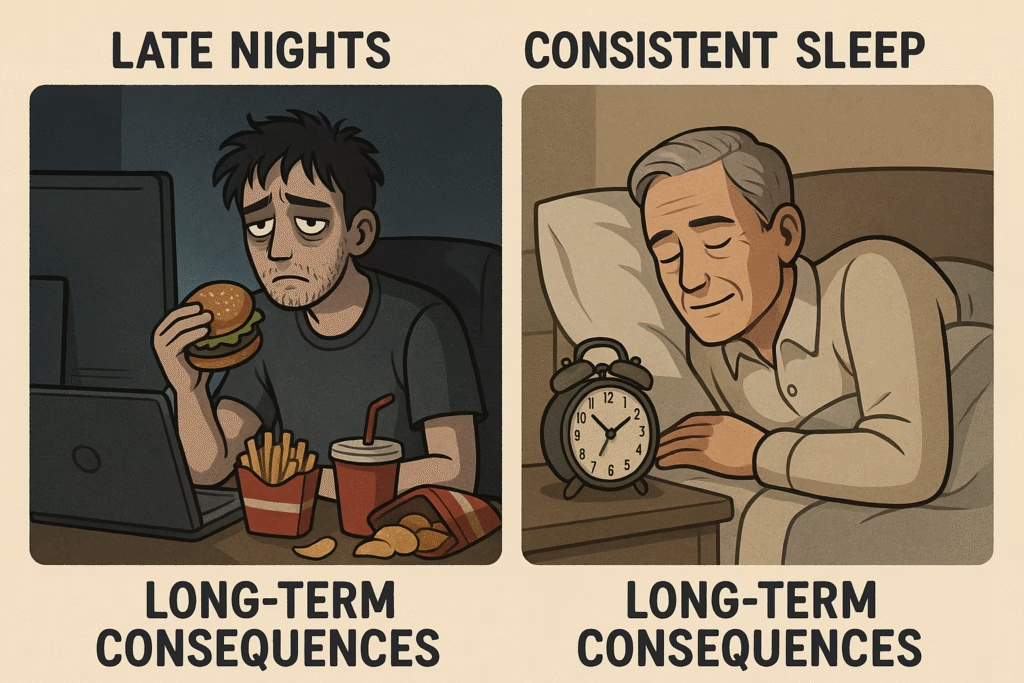
Powerlifting isn’t just physically demanding—it’s mentally taxing. The pressure of attempting maximum lifts, the stress of competition prep, and the constant push to improve all take a psychological toll. Sleep is when your brain processes these stresses and prepares you mentally for the next training session.
Sleep deprivation significantly increases anxiety and decreases your ability to handle stress. This can manifest as:
- Increased pre-lift anxiety
- Difficulty focusing during training
- Negative self-talk and doubt
- Reduced motivation to train
Quality sleep acts as a reset button for your mental state, helping you approach each training session with confidence and focus.
Recovery Protocols: Beyond Just Sleep
While sleep is the foundation of recovery, combining it with other recovery modalities can amplify its benefits:
The Complete Recovery Stack
| Recovery Method | Best Timing | Duration | Primary Benefit | Synergy with Sleep |
|---|---|---|---|---|
| Sleep | Nightly | 7-9 hours | Complete system recovery | Foundation of all recovery |
| Light Stretching/Mobility | Pre-sleep | 10-15 minutes | Muscle tension release | Promotes relaxation |
| Meditation/Deep Breathing | Pre-sleep | 5-10 minutes | Stress reduction | Faster sleep onset |
| Hot Bath/Shower | 60-90 min before bed | 10-20 minutes | Temperature regulation | Enhances sleepiness |
| Massage/Foam Rolling | Post-training or pre-sleep | 10-20 minutes | Muscle recovery | Reduces physical tension |
Creating Your Personal Sleep Protocol
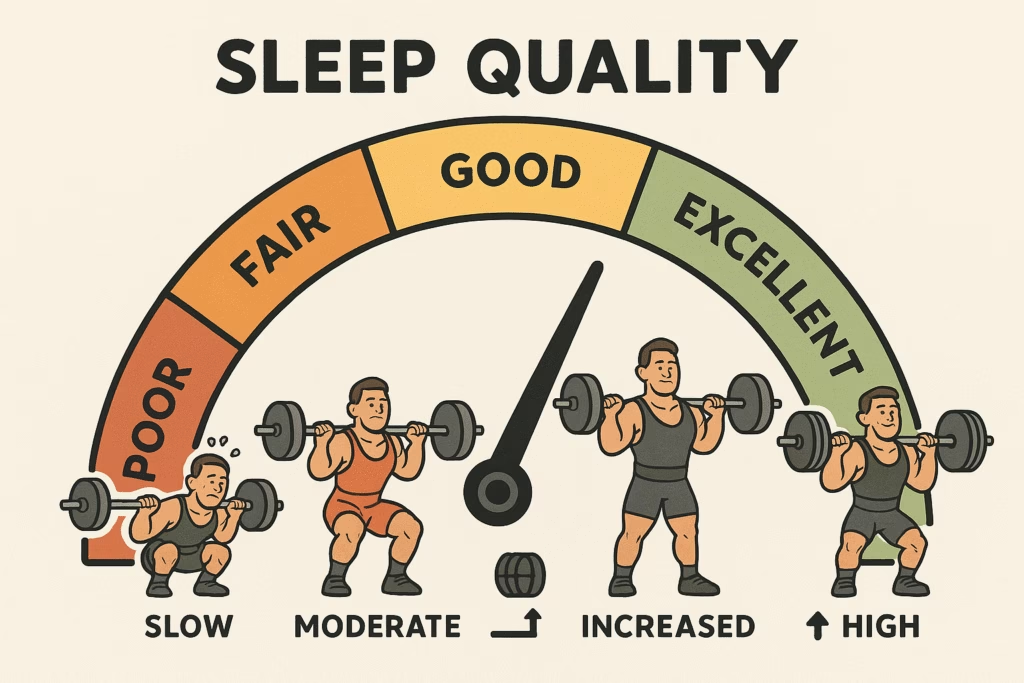
Every lifter is different, so you need to find what works for your schedule and lifestyle. Here’s how to build your personalized sleep optimization plan:
Week 1-2: Baseline Assessment
- Track your current sleep patterns without making changes
- Note how you feel and perform after different amounts of sleep
- Identify your biggest sleep disruptors
Week 3-4: Environment Optimization
- Optimize your bedroom temperature, lighting, and noise levels
- Establish a consistent bedtime and wake time
- Remove screens from the bedroom
Week 5-6: Routine Development
- Create and stick to a pre-sleep routine
- Adjust training times if necessary
- Fine-tune your caffeine cutoff time
Week 7-8: Advanced Strategies
- Experiment with pre-sleep nutrition
- Try relaxation techniques
- Consider sleep tracking technology
The Competitive Edge: Sleep as Your Secret Weapon
Think about your last competition or max effort training day. How did you sleep the night before? Chances are, your best performances came after your best nights of sleep. This isn’t coincidence—it’s biology.
Elite powerlifters understand this connection. They prioritize sleep just as much as their training, often sleeping 9-10 hours per night during peak training phases. They know that the lifter who recovers best between sessions will ultimately be the strongest on the platform.
Common Sleep Mistakes That Kill Gains
| Mistake | Why It Happens | The Cost | The Fix |
|---|---|---|---|
| “I’ll Sleep When I’m Dead” | Hustle culture mentality | 15-20% strength loss | Reframe sleep as training |
| Weekend Sleep-ins | Trying to “catch up” | Disrupts circadian rhythm | Consistent schedule 7 days/week |
| Late-Night Training | Schedule convenience | Elevated core temperature | Morning or afternoon sessions |
| Screen Time Before Bed | Habit/entertainment | Suppressed melatonin | Books, podcasts, or meditation |
| Inconsistent Schedule | Varying work/life demands | Poor sleep quality | Non-negotiable sleep/wake times |
Measuring Your Progress: Sleep Metrics That Matter
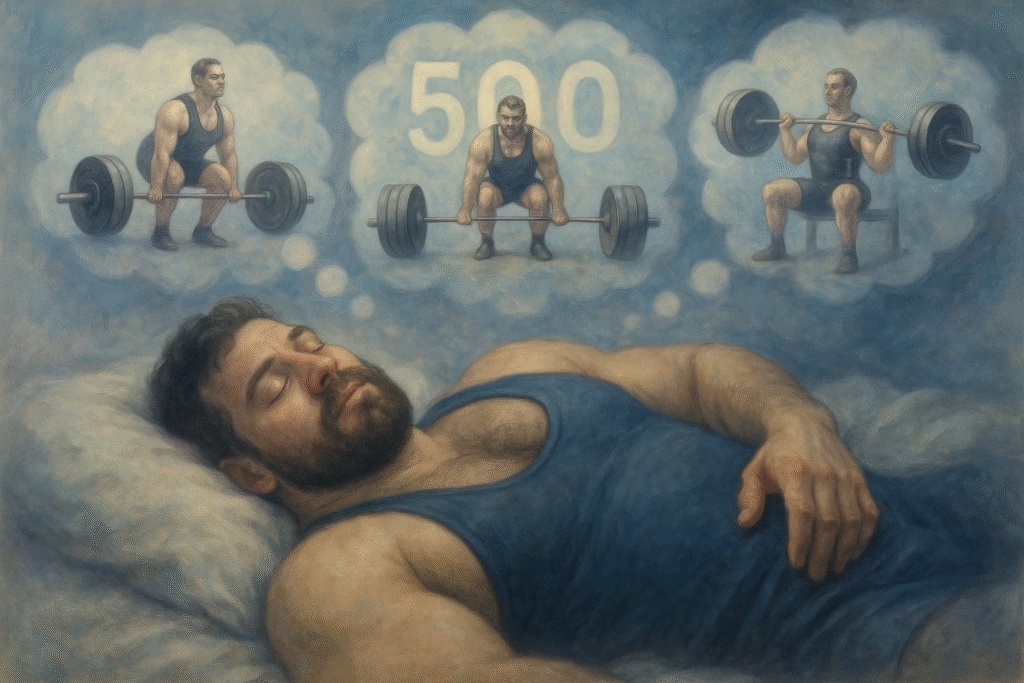
Just like you track your lifts, you should track your sleep. Here are the key metrics to monitor:
Quantity Metrics:
- Total sleep time (aim for 7-9 hours)
- Time to fall asleep (should be <20 minutes)
- Number of nighttime awakenings
Quality Metrics:
- How refreshed you feel upon waking (1-10 scale)
- Energy levels throughout the day
- Training performance correlation
- Mood and motivation levels
Performance Correlation: Track how your sleep affects your training. Most lifters find that:
- 8+ hours of sleep = PR potential
- 7-8 hours = solid training possible
- 6-7 hours = moderate performance
- <6 hours = deload day or rest day
The Long-Term Investment: Sleep and Longevity in Powerlifting
Powerlifting is a sport you can pursue for decades, but only if you take care of your body. Sleep is one of the most important factors in training longevity. Lifters who consistently get quality sleep experience:
- Fewer injuries over their career
- More consistent progress without extended plateaus
- Better recovery between intense training phases
- Maintained motivation and enjoyment of the sport
- Healthier hormone profiles as they age
Making Sleep Non-Negotiable
Start treating sleep with the same discipline you apply to your training. You wouldn’t skip a planned squat session because you “didn’t feel like it,” so don’t treat sleep any differently.
Create rules for yourself:
- Bedtime is as important as gym time
- No negotiating on sleep duration during training phases
- Sleep quality affects training decisions (poor sleep = lighter training)
- Recovery days include optimized sleep, not just rest from lifting
The Bottom Line: Your Pillow Is Your Most Important Equipment
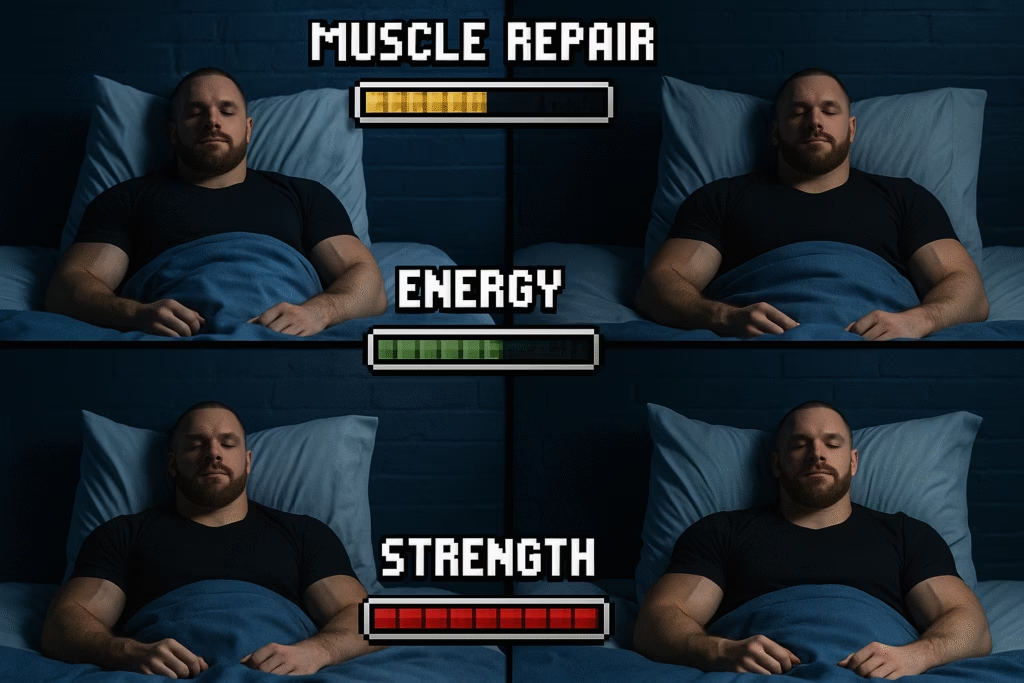
Sleep isn’t just recovery time—it’s performance enhancement time. It’s when your body builds the strength you demonstrated in the gym and prepares you to come back stronger tomorrow. In a sport where every pound on the bar matters, can you really afford to ignore the one factor that could be holding back all your other efforts?
Your pillow might just be the most important piece of equipment in your powerlifting arsenal. Use it wisely, and watch your numbers climb. Remember: champions aren’t just made in the gym—they’re made in bed, one quality night of sleep at a time.
The best part? This “hack” is completely free, natural, and available to every lifter. While your competition is searching for the next expensive supplement or exotic training method, you’ll be getting stronger simply by getting better sleep. Sweet dreams, and even sweeter PRs.
FAQs
Q: I can only get 6 hours of sleep on weeknights due to work. Should I still train heavy, or should I adjust my program?
A: No. With 6 hours of sleep, reduce training intensity to 70-80% of normal loads and focus on technique work. Avoid max efforts and PRs. Consider morning workouts and strategic 20-30 minute naps. Training hard while sleep-deprived leads to injury.
Q: I sleep 8 hours but still feel tired and my lifts suffer. What’s wrong?
A: It’s sleep quality, not just duration. Keep your room at 65-68°F, eliminate all light sources, cut caffeine 8+ hours before bed, and avoid screens 2 hours before sleep. If problems persist after 2-3 weeks, see a sleep specialist.
Q: I can’t sleep well before competitions due to anxiety. How do I fix this?
A: Practice your competition routine during training, use visualization before bed, and write down worries in a journal. Maintain your normal sleep schedule and bring familiar items if traveling. Even one poor night won’t ruin your performance if you’ve been consistent with recovery.



